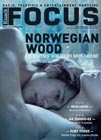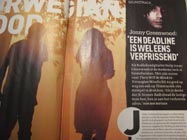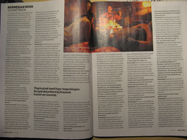"Een deadline is wel eens verfrissend"
How did you end up doing Norwegian Wood?
JG: Tran Anh Hung asked me if I wanted to write the score and I replied "No, I don't have the time - I'm working on the new Radiohead album." After that I began working on some ideas anyway, without having seen the film or read the script, merely out of interest. Then Hung asked me again - he wouldn't budge and his enthusiasm was infectious. He turned out to be a fan of 'There Will Be Blood'. Apparently he was looking for a similar blend of loveliness and menace, light and darkness.
Did you know Hungs earlier work?
No, although he used 'Creep' in his second film 'Cyclo'. I watched his debut 'The Scent of the Green Papaya' on dvd recently - both of the films are beautiful. I'd read Murakami's novel, which was my only source of inspiration from the outset. None of my first melodies have made the final film, though.
How did you start your work on the soundtrack?
There are scenes in the book in which Reiko, one of the main characters, teaches guitar lessons. I wondered which music she'd play and that's what brought up the first ideas. The images are secondary - I prefer basing my work on discussions with the filmmaker. Luckily Hung had many strange and specific suggestions. He thought it was important that the music evoked confusing emotions because the characters aren't mature just yet. At other times he showed me some close-ups and said 'Now write music that fits this facial expression'. Most directors give instructions such as 'A fast piece here, some menace there, then an emotional climax.' It's always a thankful job to be able to take off from a concrete image or idea. Paul Thomas Anderson also worked that way. Both directors don't cover everything in sound, they give their films room to breathe.
What are your examples in terms of film scores?
My favourite soundtrack is the one for 'The Comedians', a Graham Greene adaptation starring Richard Burton and Liz Taylor, taking place in Haiti. Yet I'm more inspired by the use of classical music in films, like Penderecki in 'The Shining' or Ligeti in '2001: A Space Odyssey'. Accompanied by images, that music adopts a whole new meaning.
Has your interest in film music grown from Radiohead's exploration of the boundaries of pop?
Partly, yes. When I started seven years ago, I noticed how good film scores often are. I already knew that Ennio Morricone and John Barry could come up with a good tune, but even the dumbest films often have excellent soundtracks. The fact that these bits of music of no more than two minutes can exist completely indepentendly and conjure up a whole universe really spoke to me. When I started collecting the records of Francis Lai (the French composer of the music to 'Une Home et une Femme' and 'Love Story' - editor's note), I knew: 'This is something I want to try'.
Has film music had an impact on Radiohead?
By working with classical music so often, I've found a renewed appreciation for the guitar. It's almost a whole new instrument to me when I go into the studio with Radiohead. We also use violins or even a whole orchestra more often. We used to be afraid of real musicians - we weren't classically schooled and you don't write pop songs on paper. It's a completely different world. Now we find that approach a breath of fresh air - on 'The King of Limbs' you can hear trumpets and strings, and in the future we will definitely work with other classical instruments.
A film score has to be finished in eight weeks. A Radiohead record usually takes three years. Is it a nice change of pace to be able to work quickly and efficiently?
Absolutely. But you've got the wrong guy in mind if you think I'm the difficult one in Radiohead (laughs). Thom's the perfectionist. If it were up to me, we'd make a new record every year, but maybe it's good that Thom takes such a long time. Our records are no worse for it.
What is your part in Radiohead, exactly?
Usually Thom gives us some lyrics or a half-finished song and the rest of us fill in the blanks. Then everything is deconstructed, we find another way to complete his song, and before we know it the year is up. Radiohead is like the United Nations with Thom playing China (laughs).
Yet you've still been working together for twenty years.
Because it's still exciting and chaotic. We still have no clue what it is we want exactly. Our amateurism keeps us curious and unspoiled. I would hate to know in advance how a record would sound and which stadiums we'd play afterwards.
Thom Yorke may be Radiohead's perfectionist, but you don't exactly write many soundtracks either.
I don't see myself writing three or four a year, that's correct. But it's still refrshing to have a deadline, a term Radiohead has never even heard of.
Do you see yourself becoming a ful-time classical composer eventually?
It's a tempting thought. Pop music definitely has its limitations. I've learned that no recording is perfect, no matter how long you work on it. The experience is more important than the sound. You have to be in the same room with other musicians. The involvement with classical music is addictive, definitely if you've spent a year in a studio messing around with samples or guitars. It's a pity that classical is so difficult and I don't have sufficient theoretical knowledge.
Don't many pop musicians pride themselves on not being classically trained?
True, but they are often not the most interesting. I don't believe in idiots savants, or the cliche that untrained musicians do more fascinating things because they're not hampered by technique. The more you know, the more you can forgot and the freer you are. The lessons in melody and harmony that I've taken have helped me a great deal.
The soundtrack to 'Norwegian Wood' also has a few Can songs - your idea, I assume?
Absolutely - I wanted sixties songs that fit, but weren't too familiar, nothing by The Doors or The Beach Boys. If I had to put together my favourite sixties soundtrack, there would be a lot of Can, Neu!, Kraftwerk and other krautrock bands. Those are bands from the seventies, but that's how much I like them (laughs).
The last Radiohead record, 'In Rainbows', was initially put up on the internet exclusively, and fans got to decide how much they paid for it. On average that turned out to be less than four pounds, while a third paid nothing at all. A miscalculation?
No. At least it was an event that got people talking, and everyone who downloaded the record thought about what music is worth to them and about how music needs to be sold in the future.
Have you ever downloaded music illegally?
No new records, but I have downloaded records that I own on vinyl and that I need a back-up for. Look, it's a tough discussion and will stay that way, but kids just don't buy cd's anymore. Students take their laptops to uni and fill their hard drive with music. There's no cd players around. The medium has had its heyday. I don't know if there is even a future for paid music, and the record companies can't predict that either. All ideas are welcome.


